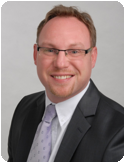Interviewing? - It’s easy!
by Walter Feichtner
Make an impression during your interview
The second biggest hurdle in the application process after the written application (almost always via e-mail nowadays) is, for many applicants, the interview. The invitation to interview presents a great opportunity which must certainly be taken.
"How do I properly market myself?" "How do I handle uncomfortable questions and provocation?" "What should I know about the company?" One should ask themselves these and many other questions before becoming personally acquainted with the potential employer.
Nervousness is nothing unusual, as the interview comprises an unbelievably crucial portion of the application process. However there is no reason to be nervous if one intensively and precisely prepares themselves beforehand. Besides, the other applicants are certainly quite tense as well.
When conversing with your potential employer, it is all about impressively presenting yourself and leaving behind a remaining first impression. According to studies, the personality of the applicant counts as 70% of the first impression. Of particular important is the ability to convincingly present oneself and their strengths while remaining relaxed.
Introduce who you are, what you wish for and emphasize your skills which are necessary for a solution-oriented approach to specific tasks or problems in the workplace! Becoming acquainted beforehand with the pattern and components of an interview helps one come off more confidently. To be perfectly prepared, practicing beforehand is also a good idea.
First off, one should be aware that interviews often follow a pre-set routine and consist of multiple phases, for which one should be prepared or adapted.
The first phase is the preparation period which the applicant works through before personal contact with the employer. The applicant becomes prepared both contentually, by researching the company, and aesthetically, by dressing appropriately. It is also recommended that one writes down a list of questions about the company which will show during the interview that they are motivated and interested.
Things progress during the conversation with the warm-up phase. The applicant introduces themselves and starts out with a little small talk, to make the atmosphere more relaxed.
While the employer then describes the company, the applicant should pay very close attention and take notes, possibly drawing back on them later.
In the next phase it is the applicant's turn to introduce themselves and hone in on their important qualifications and mention previous professional successes. "Succinct, but concrete" is the name of the game, because overly long monologues can, in the worst case, bore the interview. One's education and professional experience are not the only aspects of interest to the employer, but also the applicant's soft skills, work methods and personal interests.
During the more intensive portion, questions regarding topics such as motivation, education and family background often arise, which may sometimes be provocative. Of course such situations present a great challenge and the most uncomfortable portion of the conversation, but with the proper preparation for potential questions the applicant beams with confidence and can also successfully master this phase.
After the position and scope of responsibilities are introduced, often in detail, the applicant has the opportunity to express interest in the company with intelligent questions, e.g. regarding ongoing projects and continued education or development possibilities.
Topics such as a work contract and wage negotiations are often only discussed during subsequent discussions. However, one should note that, regarding questions on salary, they should be aware of the market value and wage structure of the company.
At the end of the interview a brief summary of the items discussed is very prudent so as to clarify crucial terms and potential misunderstandings. It is also common for the applicant to address the next steps, express gratitude for the cordial interview and, ideally, make contact either by phone or e-mail with the primary interviewer to emphasize one's motivation and great interest in the position.
Punctuality, communication skills, conciseness and honesty are the key terms, combined with self-confidence and a relaxed demeanor, on the way to a successful interview.
The worst errors one can make in the application process are incomplete and unconvincing curricula vitae, poor application photos, and a lack of eye contact with the interviewer and negative remarks about one's prior employer during the interview.
Suitable post-processing in order to be clear whether the job is suitable for the applicant and/or suits their ideas also helps ensure a good interview. One wishes to be challenged in the new job, but not overly or under-challenged.
Then your professional career can begin.

Walter Feichtner
Owner and Career Consultant
Karrierecoach München
Viktoriastr. 1
80803 München
info@karrierecoach-muenchen.de
www.karrierecoach-muenchen.de
